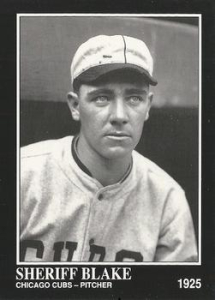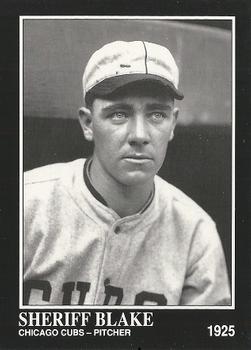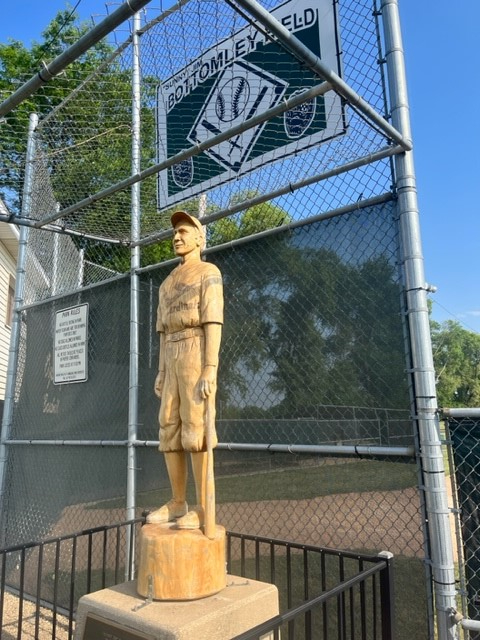September 13, 1928: Cubs win one for the road over Cardinals behind Sheriff Blake’s 4-hit gem
 The 1928 National League season was approaching its waning stages on September 13, with just 17 days remaining in the 154-game schedule. It had turned into a three-team dogfight for the pennant between the St. Louis Cardinals, New York Giants, and Chicago Cubs, with St. Louis holding a three-game lead over both rivals. The Cardinals and Cubs were set to square off one last time in Chicago for a game that had obvious pennant-race implications.
The 1928 National League season was approaching its waning stages on September 13, with just 17 days remaining in the 154-game schedule. It had turned into a three-team dogfight for the pennant between the St. Louis Cardinals, New York Giants, and Chicago Cubs, with St. Louis holding a three-game lead over both rivals. The Cardinals and Cubs were set to square off one last time in Chicago for a game that had obvious pennant-race implications.
It was the last home game of the season for the Cubs, “unless, perchance, they should come marching home a couple weeks hence to engage in a world’s series classic,” Chicago Tribune writer Irving Vaughan observed.1 And it was a makeup game necessitated by a rain washout on August 29, described by the Prohibition-era Chicago Tribune as one that “deluged the Wrigley premises with more water than will ever be needed for chasers if the country again goes wet.”2
A full house was on hand at Wrigley Field that Thursday afternoon. In fact, according to the Associated Press account in the New York Times, it was a record National League weekday crowd of 45,000.3 The throng increased the Cubs’ league-leading 1928 home attendance to 1,143,740.4
The first pitch for the hastily rescheduled game was scheduled for 1 P.M. The Cubs and Cardinals took the field on a rain-free 70-degree day. With their respective travel plans set and a game between teams from the Chicago and Detroit Fire Departments scheduled for 4 P.M. at Wrigley,5 both teams likely hoped for a quick game.6
Right-hander John “Sheriff” Blake started for the Cubs, four days before his 29th birthday. In five starts against St. Louis in 1928, Blake had three complete-game wins, but most recently he had lost to the Cardinals on August 27 at Wrigley Field. His mound opponent was 37-year-old lefty Clarence Mitchell, a journeyman in the 14th season of his 18-year big-league career and one of 17 pitchers sanctioned to throw the spitball after it was outlawed in 1920.7 Mitchell had thrown a seven-hit shutout during the Cardinals’ last visit to Chicago, on August 28.
There was no score after a snappy first 2½ innings, but the Cubs drew first blood in the bottom of the third. Blake, who hit a respectable (for a pitcher) .216 for the season, helped his own cause with a single and advanced a base on a bunt by Woody English, then went to third on Freddie Maguire’s groundout to short and scored on Kiki Cuyler’s single.
The Cardinals tied it up in the top of the fourth inning. After Frankie Frisch walked, Jim Bottomley and George Harper stroked successive singles to center field, scoring Frisch.
The Cubs responded with a run in the fourth to regain a lead they did not relinquish. With one out, Charlie Grimm “sneaked a ground-hugging single between [Cardinals shortstop Rabbit Maranville and the fancy diving [second baseman] Frisch,” according to Irving Vaughan of the Chicago Tribune. Grimm scored when Gabby Hartnett hit a liner to center that bounced off the screen and hopped around. Harnett easily reached third, and Grimm scored.8 Cubs 2, Cardinals 1.
St. Louis stirred when Andy High and Frisch hit back-to-back two-out singles in the fifth, but the runners were stranded when Bottomley—who went on to lead the league in home runs and RBIs and receive NL MVP honors—flied to Hack Wilson in center field.
The Cubs delivered the knockout punch to Mitchell in the bottom of the fifth. The Tribune’s Vaughan credited English, who hit a “low looper behind third and charged into second head-first just in time to beat the return throw,” with igniting the rally with a hustling double. After English advanced to third on a sacrifice by Maguire, Cuyler lined a double to right field that scored English and ended Mitchell’s day.
Syl Johnson replaced Mitchell. Cuyler moved up on an error by third baseman High on a muffed steal putout and scored on a sacrifice fly by Wilson, who increased his season RBI total to 106. It was Cubs 4, Cardinals 1 after five innings.
The Cardinals’ Chick Hafey walked to open the top of the sixth, but Harper struck out and Hartnett gunned down Hafey stealing second. Blake induced Jimmie Wilson to ground out to end the inning, then retired St. Louis in order in the seventh, eighth, and ninth.
By then the Cubs had added two two-out insurance runs in the bottom of the eighth. “Then Beck singled over third and Blake slammed a single into center. English mopped up with his triple that sailed to the corner of the left center bleacher,” Vaughan wrote.9 Beck and Blake scored on English’s third hit of the day and extended the Cubs’ lead to 6-1, where it stayed when the game ended 1 hour and 37 minutes after the first pitch. (The Chicago and Detroit Fire Department teams then took the field as planned, with 20,000 fans in attendance.10)
Blake’s four-hitter improved his season record to 15-10. Mitchell dropped to 7-8.
Meanwhile, the Giants were snapping a tie with three runs in the top of the ninth, then bringing rookie Carl Hubbell out of the bullpen to secure the final out of a 7-6 win over the Boston Braves and cap a doubleheader sweep. When the sun set on September 13, just two games separated the three top teams.
|
|
W |
L |
GB |
|
Cardinals |
83 |
55 |
– |
|
Giants |
81 |
56 |
1.5 |
|
Cubs |
82 |
58 |
2 |
After the game, in an era of rail travel, both the Cubs and the Cardinals were bound for the Eastern Time Zone and would be “rushed eastward on a special over the Pennsylvania [Railroad].”11 The Cards exited in Philadelphia, arriving before noon in time for their scheduled Friday game with the Phillies.
The Cubs continued on the Penn Special to Boston, where they arrived on Friday evening. Their game originally scheduled for Friday, had already been rescheduled as part of a Saturday doubleheader. It was followed by a Sunday off, then two single games on Monday and Tuesday. (Sunday baseball was not legal in Massachusetts until the 1929 season.12)
For the Cubs, what remained were 14 games on the road against the Braves, Brooklyn Robins, Philadelphia Phillies, Giants, and Cincinnati Reds, ending with a one-game set in Cincinnati on September 30.
For the Cardinals, their own season-ending 17-game road trip started with this day trip to Chicago. It was followed by series against the Phillies, Giants, Robins, and Braves, and a single-game finale against the Giants at the Polo Grounds.
Meanwhile, the third dog in the race, the Giants, swept the Braves in a September 14 doubleheader—their fourth twin-bill sweep in five days at Braves Field. While its rival contenders finished the season with long road trips, New York ended with a homestand at the Polo Grounds starting with a game against Brooklyn, followed by games with Pittsburgh, St. Louis, Cincinnati, and Chicago, and a one-game finale with the Cardinals.
Buoyed by their rousing win over the Cardinals, the Cubs arrived in Boston “bristling with confidence.” And why not? They had narrowed the National League lead to just two games with four games on tap against the hapless Braves, who were headed for their third straight seventh-place finish in the eight-club NL. Even Hack Wilson, “who is given to speech making on only rare occasions, remarked, ‘We’ll win this darned thing yet, no foolin’,” reported the Chicago Tribune.13
They did not win it. While the Cubs won the battle on September 13 before their record full house, they lost the war. The Cardinals took 12 of 16 on the road to clinch the NL pennant—with an assist from the Cubs, who won three of four games at the Polo Grounds in the last week of the season to eliminate the Giants.14
Chicago’s season-ending 9-5 road trip left the Cubs with 91 wins, trailing the Cardinals (95) and Giants (93). The nucleus of this Cubs team was back to capture the 1929 National League title and reaffirm a perpetual Cubs motto of “wait until next year.”15
Author’s Note
This article was inspired by the author’s Summer 2023 visit to the Jim Bottomley statute in Oglesby, Illinois, Bottomley’s hometown.
Acknowledgments
Special thanks to John Fredland and Gary Belleville for editorial expertise, valuable input, and special thoughts on this significant game in the 1928 NL pennant race.
This article was fact-checked by Laura Peebles and copy-edited by Len Levin.
Sources
The author referred to Baseball-Reference.com and Retrosheet.org for box scores, play-by-play information, and other pertinent data.
https://www.baseball-reference.com/boxes/CHN/CHN192809130.shtml
https://www.retrosheet.org/boxesetc/1928/B09130CHN1928.htm
Notes
1 Irving Vaughan, “Cubs Play for Pennant Chance Today,” Chicago Tribune, September 13, 1928: 19.
2 “McCarthy Seeks Aid; Gets Tincup from Louisville,” Chicago Tribune, August 30, 1928: 17.
3 Associated Press, “Cubs Upset Cards as 45,000 Look On,” New York Times, September 14, 1928: 29.
4 The attendance record was aided by the completion of Wrigley Field’s upper deck on the third-base side in 1928. (The upper deck on the first-base side had been added in 1927.) Al Yellon, “A History of Wrigley Field Changes,” BleedCubbieBlue.com, April 15, 2013, https://www.bleedcubbieblue.com/2013/4/15/4226660/wrigley-field-renovations-history. Next best in the majors was the New York Yankees with 1,072,132. The Giants were runners-up in the National League with 916,191.
5 City-rivalry and local games were popularly prevalent at the time and even garnered coverage in the local newspapers. This Wrigley game was game two of a three-game series that the Chicago Fireos ultimately swept against the “smoke eaters” from Detroit (so named in the Chicago Tribune game accounts). Vaughan observed, “Spectators for the battle of the Fireos will not be admitted in the park until after the crowd attending the league game has been dispersed.” “Firemen Begin Play Today in ‘Crucial’ Series,” Chicago Tribune, September 12, 1928: 22; “Chicago Fireos Whip Detroit, 2-1; Win Series.” Chicago Tribune, September 14, 1928: 23.
6 Vaughan, “Cubs Play for Pennant Chance Today.”
7 “Major League Pitchers Officially Given Permission to Use Spitball,” Baseball-Almanac.com, accessed August 1, 2023, https://www.baseball-almanac.com/legendary/lispit.shtml.
8 Irving Vaughan, “Cubs Win; Two Games from Lead,” Chicago Daily Tribune, September 14, 1928: 23. (Wrigley Field outfield configuration in 1928 was a square grid with a quirky “jury box” protruding in left field. No vines, no curved walls, no revenue rooftop seats.)
9 “Cubs Win, Two Games from Lead.”
10 The Chicago Firemen “defeated the Motor City fire extinguishers … 2 to 1. About 20,000 saw the game.” Coupled with the 45,000 for the Cubs-Cardinals game, an estimated paid attendance of 65,000 saw baseball at Wrigley Field in Chicago on September 13, 1928. Chester Sullivan of squad No. 8, captain and manager of Chicago, hit a game-winning walk-off home run in game one, hit a game-tying single in game two, and was certainly the MVP.
11 Vaughan, “Cubs Play for Pennant Chance Today.”
12 Of the eight teams in the National League in 1928, Boston, Brooklyn, the New York Giants, and Philadelphia were the easternmost teams. Pittsburgh, Cincinnati, Chicago, and St. Louis were considered the teams of a Western road trip, with St. Louis being the only major-league city west of the Mississippi (and then only because it was on the west bank of the river). Cross-country road travel was by rail. Charter motorbus transport was surely the choice for shorter jaunts. Sunday baseball was still prohibited by law for the Pirates and Phillies in Pennsylvania and the Braves in Massachusetts, which resulted in unusual one-game Sunday road trips and random midweek doubleheaders.
13 Irving Vaughan, “Cubs Bristling with Confidence, Invade Boston,” Chicago Tribune, September 15, 1928: 21.
14 But the Cardinals were swept 4-0 in the 1928 World Series by the seemingly invincible New York Yankees.
15 The Cubs’ 1929 World Series opponent was the Philadelphia A’s. Different opponent, same result. The National League representative was defeated once again, four games to one.
Additional Stats
Chicago Cubs 6
St. Louis Cardinals 1
Wrigley Field
Chicago, IL
Box Score + PBP:
Corrections? Additions?
If you can help us improve this game story, contact us.



